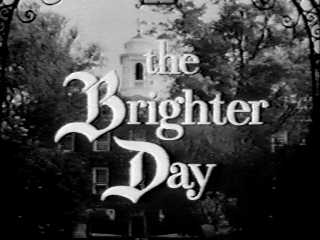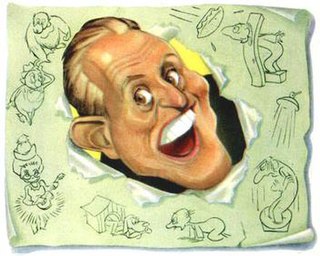Related Research Articles

John Randolph Webb was an American actor, television producer, director, and screenwriter, most famous for his role as Joe Friday in the Dragnet franchise, which he created. He was also the founder of his own production company, Mark VII Limited.
The year 1954 in television involved some significant events. Below is a list of television-related events in 1954.

Barbara Jill Walters was an American broadcast journalist and television personality. Known for her interviewing ability and popularity with viewers, she appeared as a host of numerous television programs, including Today, the ABC Evening News, 20/20, and The View. Walters was a working journalist from 1951 until her retirement in 2015. Walters was inducted into the Television Hall of Fame in 1989, received a Lifetime Achievement Award from the NATAS in 2000 and a star on the Hollywood Walk of Fame in 2007.

Truth or Consequences is an American game show originally hosted on NBC radio by Ralph Edwards (1940–1957) and later on television by Edwards (1950–1954), Jack Bailey (1954–1956), Bob Barker (1956–1975), Steve Dunne (1957–1958), Bob Hilton (1977–1978) and Larry Anderson (1987–1988). The television show ran on CBS, NBC and also in syndication. The premise of the show was to mix the original quiz element of game shows with wacky stunts.

Edward Macdonald Carey was an American actor, best known for his role as the patriarch Dr. Tom Horton on NBC's soap opera Days of Our Lives. For almost three decades, he was the show's central cast member.

The Brighter Day is an American daytime soap opera which aired on CBS from January 4, 1954, to September 28, 1962. Originally created for NBC Radio by Irna Phillips in 1948, the radio and television versions ran simultaneously from 1954–1956. Set in New Hope, Wisconsin, the series revolved around Reverend Richard Dennis and his four children, Althea, Patsy, Babby and Grayling.

Father Knows Best is an American sitcom starring Robert Young, Jane Wyatt, Elinor Donahue, Billy Gray and Lauren Chapin. The series, which began on radio in 1949, aired as a television show for six seasons and 203 episodes. Created by Ed James, Father Knows Best follows the lives of the Andersons, a middle-class family living in the town of Springfield. The state in which Springfield is located is never specified, but it is generally accepted to be located in the Midwestern United States.

House Party is an American radio daytime variety/talk show that aired on CBS Radio and on ABC Radio from January 15, 1945 to October 13, 1967. The show had an equally long run on CBS Television as Art Linkletter's House Party and, in its final season, The Linkletter Show, airing from September 1, 1952 to September 5, 1969.

Arlene Francis was an American game show panelist, actress, radio and television talk show host. She is best known for her long-running role as a panelist on the television game show What's My Line?, on which she regularly appeared for 25 years, from 1950 to 1975, on both the network and syndicated versions of the show.

One Man's Family is an American radio soap opera, heard for almost three decades, from 1932 to 1959. Created by Carlton E. Morse, it was the longest-running uninterrupted dramatic serial in the history of American radio. Television versions of the series aired in prime time from 1949 to 1952 and in daytime from 1954 to 1955.
These Are My Children is an American television soap opera, or novella, that ran on NBC from January 31 to March 4, 1949. The show was broadcast live from WNBQ in Chicago, Illinois, airing 15 minutes a day, five days a week, at 5 p.m. EST. It is widely credited as the first soap opera broadcast on television. It may be more accurately described as the first daytime drama or the first soap opera strip, as it was preceded by DuMont series Faraway Hill in 1946 and Highway to the Stars in 1947, both of which are described as soap operas but aired later in the evenings and broadcast only once a week; Guiding Light had also been in production for 12 years once These Are My Children debuted, but only as a radio series - its TV version did not debut until 1952.

The First Hundred Years is the first ongoing TV soap opera in the United States that began as a daytime serial, airing on CBS from December 4, 1950 until June 27, 1952.

An anthology series is a written series, radio, television, film, or video game series that presents a different story and a different set of characters in each different episode, season, segment, or short. These usually have a different cast in each episode, but several series in the past, such as Four Star Playhouse, employed a permanent troupe of character actors who would appear in a different drama each week. Some anthology series, such as Studio One, began on radio and then expanded to television.

Cameo Theatre is an American anthology series that aired on NBC during the Golden Age of Television, from 1950 to 1955, three times as a summer replacement and once as a mid-season replacement for other series.

Kathleen Norris Stark Caruso, professionally known as Kathi Norris was an American writer and television presenter.

Days of Our Lives is an American television soap opera that streams on the streaming service Peacock. The soap, which aired on the American television network NBC from 1965 to 2022, is one of the longest-running scripted television programs in the world, airing nearly every weekday since November 8, 1965. A co-production of Corday Productions and Sony Pictures Television, the series was created by husband-and-wife team Ted Corday and Betty Corday. During Days of Our Lives' early years, Irna Phillips served as a story editor for the program and many of the show's earliest storylines were written by William J. Bell, who would depart the series in 1975 to focus full-time on The Young and the Restless, which he created for CBS in 1973. Following the 2007 cancellation of Passions, Days of Our Lives remained the only soap opera airing on NBC. On August 3, 2022, NBCUniversal announced that it would relocate the series exclusively to its Peacock streaming service beginning September 12 after 57 years on the network and leaving NBC as the only Big Three network without a daytime serial.

Teri Louisa Keane was an American actress known for her work in the era of old-time radio. She was reported to have "appeared in more than 100 dramatic roles in radio and television." For a twelve-year period, from Oct 1963 to April 4, 1975, she played Martha Spears Marceau, the wife of police chief Bill Marceau on the CBS-TV daytime drama The Edge of Night.

Ted Steele was an American bandleader and host of several radio and television programs. He also held administrative positions at radio stations and had his own media-related businesses.
Margaret Sangster was an American writer who primarily produced scripts for radio programs.
Whispering Streets is an American radio romance drama that was broadcast from March 3, 1952, until November 25, 1960, first on ABC and later on CBS.
References
- 1 2 3 4 5 6 7 Dunning, John (May 7, 1998). On the Air: The Encyclopedia of Old-Time Radio. Oxford University Press, USA. p. 474. ISBN 978-0-19-507678-3 . Retrieved August 15, 2023.
- 1 2 3 McNeil, Alex (1996). Total Television: the Comprehensive Guide to Programming from 1948 to the Present (4th ed.). New York, New York: Penguin Books USA, Inc. p. 582. ISBN 0-14-02-4916-8.
- ↑ "Radio and Television: Negro College Choirs to Be Heard in Series of Programs on A.B.C. Starting April 23" . The New York Times. April 14, 1950. p. 46. Retrieved August 13, 2023.
- ↑ "A.B.C. Radio Drops 3 Daytime Shows: Network Will Put on a Live Program With Music at l0 — Four Bid for Mutual" . The New York Times. July 15, 1957. p. 41. Retrieved August 13, 2023.
- 1 2 Sangster, Margaret (April 1950). "The Story of My True Story". Radio TV Mirror. pp. 28–29, 103. Retrieved September 26, 2023.
- ↑ Sangster, Margaret (February 1952). "A Weeding Ring for Mary". Radio-TV Mirror. pp. 32, 98–99. Retrieved September 26, 2023.
- ↑ "Mag-Radio Tie-Ups". Billboard. May 17, 1947. p. 18. Retrieved August 15, 2023.
- ↑ "ABC 'Mr. 4x5' Sales Pitch". Billboard. February 4, 1950. p. 10. Retrieved August 15, 2023.
- ↑ "Awards Winners for 1950". Radio Television Mirror. May 1951. p. 70. Retrieved September 26, 2023.
- ↑ "NBC Radio's "My True Story" honored by American Cancer Society". NBC Trade News. May 7, 1958. Retrieved September 26, 2023.
- ↑ Terrace, Vincent (January 10, 2014). Encyclopedia of Television Shows, 1925 through 2010, 2d ed. McFarland. p. 736. ISBN 978-0-7864-8641-0 . Retrieved August 15, 2023.
- ↑ Brooks, Tim; Marsh, Earle (1999). The Complete Directory to Prime Time Network and Cable TV Shows 1946-Present (7th ed.). New York: The Ballentine Publishing Group. p. 705. ISBN 0-345-42923-0.
- ↑ "Dramatic Shows". Ross Reports. June 18, 1950. p. 6. Retrieved August 15, 2023.
- 1 2 "My True Story". Variety. May 10, 1950. p. 27. Retrieved September 27, 2023.